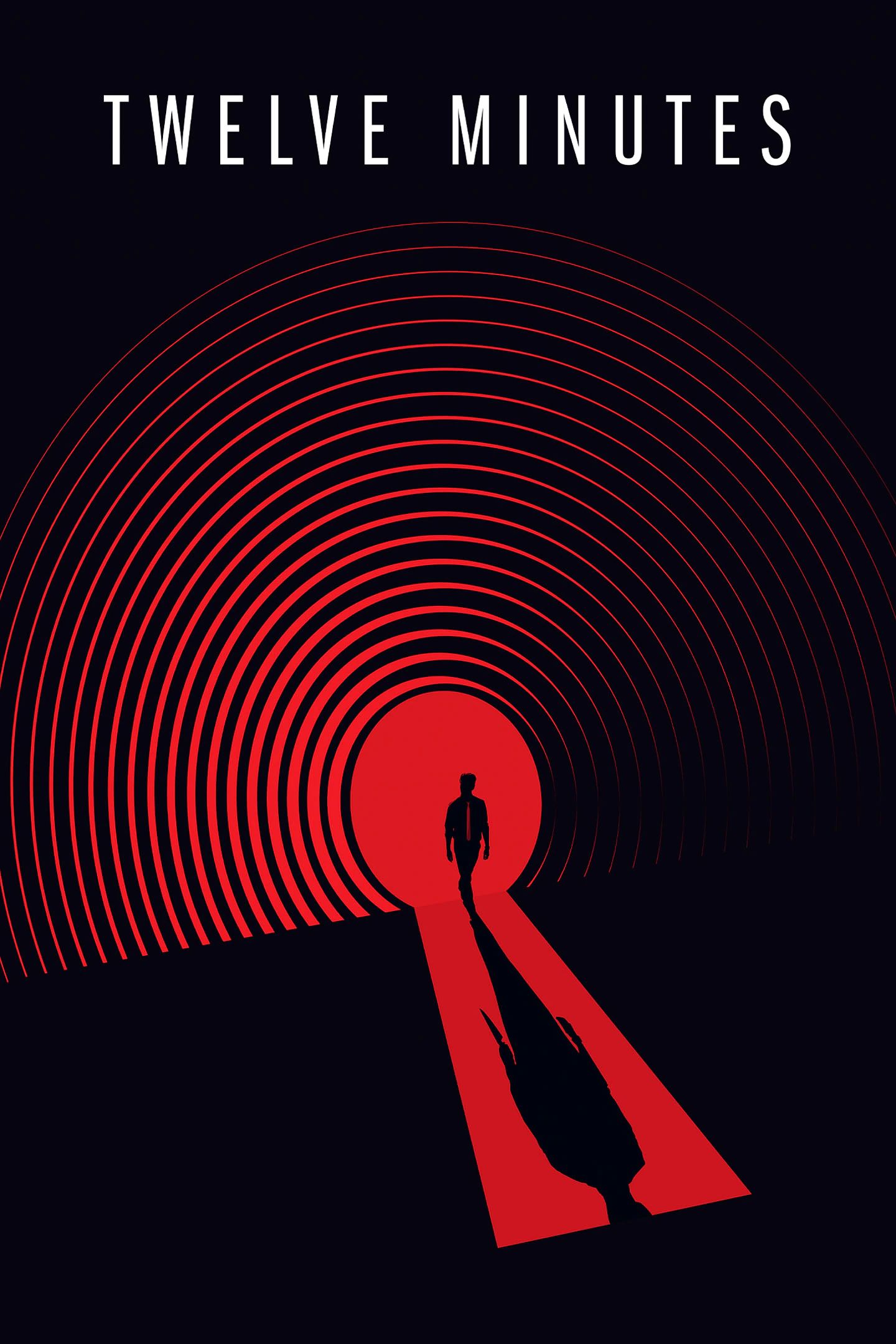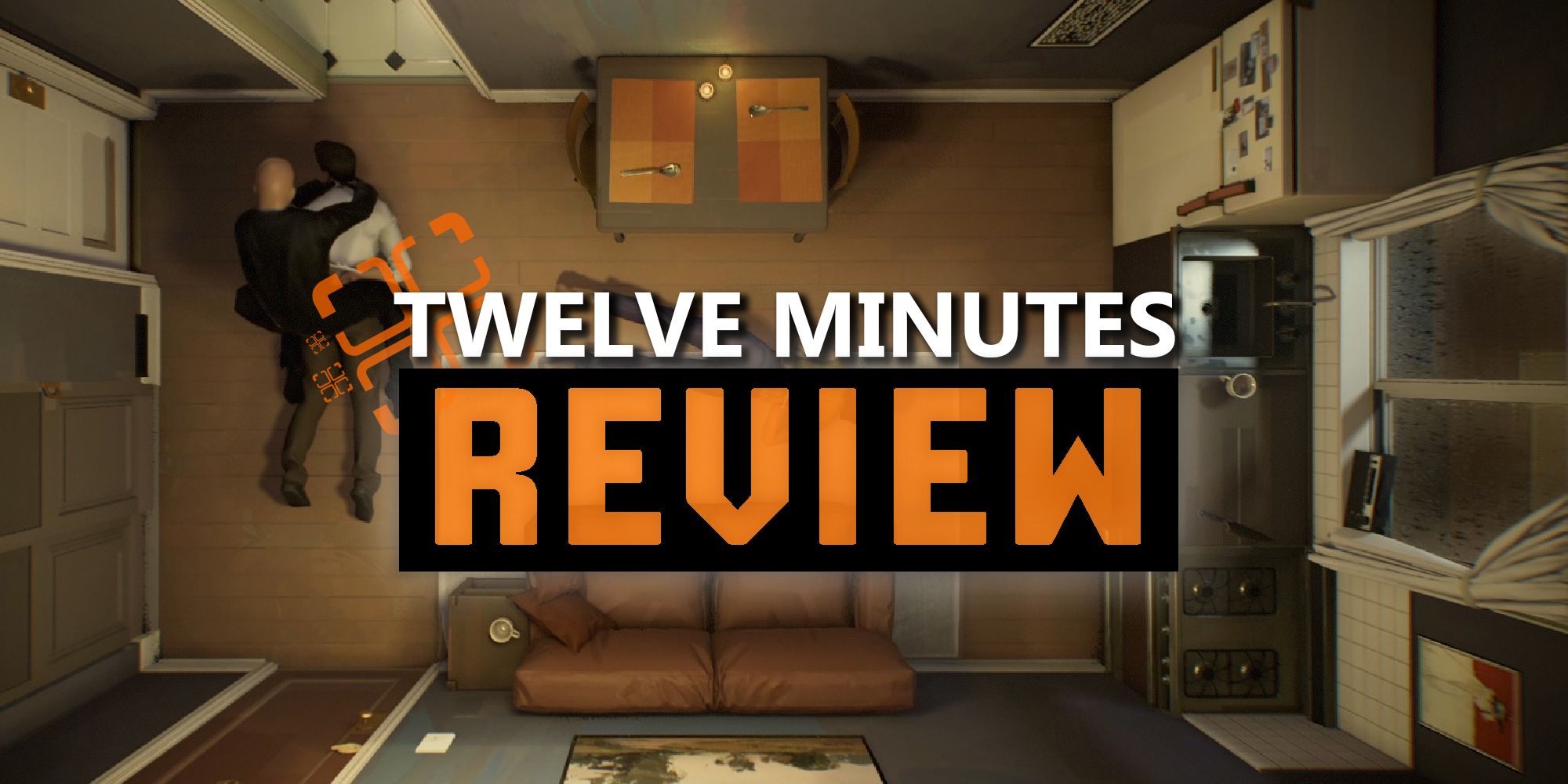Twelve Minutes isn't the bold, genre-busting narrative experiment it portrays itself as—but for the first few hours at least, it's great at fooling you into thinking it is. It has a neat time travel premise, a premium cast of talented Hollywood actors, the simmering tension of a Hitchcock thriller, an absorbing neo-noir atmosphere, and a beautiful score. And it combines these elements in a confident, compelling way, drawing you deep into a very messy, very human drama. But look past the slick presentation and general air of cinematic prestige and you realise that, at its core, it's really just a straight-up point-and-click adventure—like Monkey Island for people who type the names of films in all caps on Twitter.
The entire game takes place in a small apartment, viewed from above. There are a few perspective changes, but otherwise the game fully commits to this looming, voyeuristic view of the apartment and the young married couple living there. It's a daring artistic choice, and I like how it gives you a slightly uneasy feeling of intruding into their lives. The unnamed couple, played by Daisy Ridley and James McAvoy, are enjoying a romantic night in, when suddenly there's a knock at the door. A man claiming to be a police officer—played with gleeful menace by Willem Dafoe—kicks the door down, ties you both up, and strangles you to death before you realise what's going on. Game over? Not quite.
The man appears back at the front door of the apartment, 12 minutes before the 'cop' arrives, very much alive and unstrangled. That's right: we're in a time loop, baby. And so begins the convoluted, surprisingly lengthy, and frequently frustrating process of breaking the cycle and ending this repeating home invasion nightmare once and for all. If you die, time resets, so stabbing yourself with a kitchen knife won't free you. Same deal if you try to just leave the apartment. And even if you do manage to stop the intruder breaking in and murdering you, you still only have 12 minutes before the space-time continuum rudely resets itself and you're right back where you started. Time is not on your side in Twelve Minutes.
The apartment is small, but richly interactive—and your wife will almost always react in some way to your weird behaviour. If you walk into the closet, shut the door, and stand motionless, she'll ask you what the hell you're doing—unaware that this is a handy way to skip time when waiting for a certain event to trigger in the loop. If you dig out a surprise present she bought you, from its hiding place in a bedroom drawer, she'll be pissed off. If you fill a cup of water and offer it to her, she'll thank you. It's an impressively intricate puzzle box, with lots of things to prod and poke at as you try to figure out how to escape your temporal dilemma—and you will try everything, with increasing desperation, as the game goes on.
You walk around by pointing and clicking, moving the cursor with a mouse or the right stick of a controller. There's an inventory at the top of the screen where junk you pick up is stored, which can be combined or used on objects and people in the world. Like I said: it's an old school adventure game, steeped in the design of the genre's 1990s heyday—sometimes to a fault. Getting through the story involves working out a series of precise, elaborate, strictly timed sequences. Doing so is largely a case of trial and error, trying things over and over again, failing, swearing under your breath, until a spark of inspiration hits you.
For anyone who's played a classic Sierra or LucasArts adventure, this sensation of constantly veering between inspiration and frustration will be an all too familiar feeling. But I do love how journeying down one path can suddenly open up another. If you somehow manage to interrogate the intruder (no mean feat—if you so much as go near him, he'll kill you with one punch), he may reveal something that inspires a whole new sequence—and sends the story spiralling into territory you never imagined it would. This is Twelve Minutes' greatest strength: the way the plot steadily unravels, growing more complex, making you question things you've seen or heard up until that point.
It goes on for much longer than I expected too. On more occasions than I can count, I completed a long, complicated sequence of events—with what felt like a neat resolution to the story at the end—only to find myself back at the beginning of the loop. In one sense, I was intrigued that there was more of this tangled web of a narrative to discover. In another, my feelings mirrored that of the main character as he pounds his fists on the apartment's hardwood floor, angry and confused, feeling like nothing he's doing is having any effect. All in all, it took me about seven hours to finish. But it felt longer in my head—especially towards the end when I felt like I was vainly grasping for new solutions.
Eventually, over time, the loop begins to grate. When you mess up one step in an especially tricky sequence, your natural urge to quickly restart is hampered by repetition. Your wife approaches you at the start of every loop to say hello, during which time you can't do anything, which gets really annoying when you just want to get back to where you were and continue experimenting. The character movement is disappointingly clunky and sluggish too. It feels like you're walking through treacle. And even though you can skip through previously heard dialogue (very slowly, line by line), there's no option to speed up the loop itself—a feature that would have made the repetition a lot more bearable.
For a game whose entire design is based around repeating things over and over again, it sure makes doing so a chore. But even when I was hurling insults at my monitor, I was still utterly transfixed by it. There's something about being stuck in such a tight, claustrophobic space with these flawed characters that I found extremely absorbing. Slowly picking away at their seemingly mundane lives, revealing layers of darkness and intrigue, it was easy to get swept up in the drama. The acting is great too. Ridley and McAvoy play the two leads in a convincingly understated way. But it's Dafoe's villain—fiery and threatening in one moment, tragic and lost in the next—who really shines. It's a real treat having him in a video game.
Twelve Minutes is a good adventure game, but its puzzle design makes it feel—mature, cinematic presentation aside—like something of a relic. If it was released in 1995, you'd be ringing up the LucasArts hint line for help and getting scolded by your parents for running up a massive phone bill. But it has its charms, and the way the story is gradually peeled back, growing more disturbing with each loop, is effectively done. There's a huge amount of emotion, drama, and conflict squeezed into this tiny, dingy three-room apartment. But also a lot of frustration as you struggle to determine precisely the correct sequence of events to let you move the story forward and finally get some closure.
Score: 3/5
Twelve Minutes is available on PC, Xbox One, and Xbox Series X/S. We tested the PC version. Review code was provided by the publisher.

12 Minutes
Starring Hollywood talent James McAvoy, Daisy Ridley, and Willem Defoe, Twelve Minutes is a thriller in which you have to navigate a time loop and figure out how to avoid your impending death.


.png)
.png)
-1.png)
